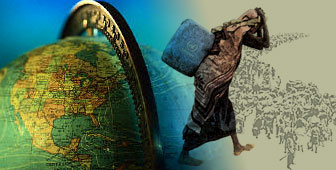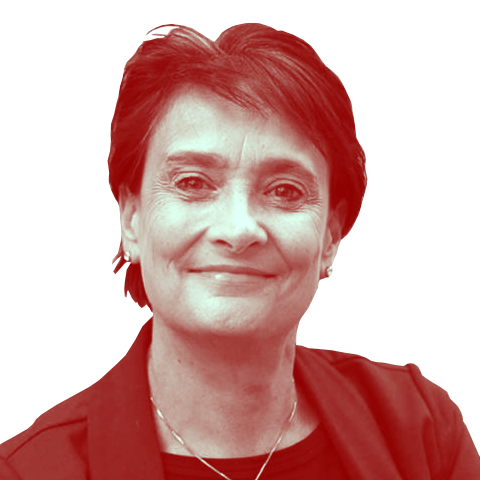“Respect” the watchword for refugee day

Every year the Swiss Refugee Council marks refugee day with a series of events and discussions designed to highlight not only the difficulties faced by refugees, but also the benefits new cultures can bring to Switzerland. This year also marked a very special birthday: it is 50 years since the Geneva Convention on Refugees.
To mark the anniversary, the Swiss Refugee Council chose a very unusual venue for refugee day: Zurich main station. The lofty passenger hall was decorated with balloons and banners reminding people that the key word for refugee day 2001 was “respect”.
Around the hall there were also dozens of television screens, showing harrowing pictures of recent refugee crises, from Rwanda, to Bosnia, to East Timor and Kosovo.
The choice of the station as venue was a careful one, and designed to make people reflect on the situation of refugees. Travellers, after all, are in a sort of limbo: they have left home, but not yet reached their destination. The same is true for refugees, except that for them the limbo can last for months or even years.
The main topic of debate for refugee day was the role of the media in influencing public attitudes towards refugees. Professor Kurt Imhof, of Zurich University, presented a detailed analysis of the way Swiss journalists have portrayed refugees from the start of the Geneva Convention in 1951 to the present day.
“Refugee policy and domestic policy are very closely linked,” said Imhof, “and journalists can play a very influential role in both debates.”
Imhof showed how, during the 1950’s and 1960’s, refugees from Hungary and Czechoslovakia were feted in the Swiss press as heroic upholders of democracy who had escaped totalitarian regimes.
“It was the time of the Cold War”, Imhof explained, “and these refugees were very useful examples of how Switzerland was standing up to Communism.”
Later though, Imhof demonstrated how things had changed. During the 1980’s and 1990’s refugees from Sri Lanka, Turkey, and former Yugoslavia were often portrayed as at best economic migrants, and at worst hardened criminals.
Refugee and asylum issues
“In fact,” Imhof said, “the coverage of refugee and asylum issues in the Swiss media during the last 50 years can tell us a great deal about Switzerland and what the Swiss were worried about, but practically nothing about the refugees themselves.”
The Swiss Refugee Council hopes the debate will encourage journalists to take their responsibilities towards refugees more seriously. Alberto Achermann, general secretary of the Council, pointed out that there was an interesting discrepancy between how journalists portray refugees.
“At the height of a refugee crisis, when thousands of people are fleeing, as was the case in Kosovo,” Achermann explained, “we see extremely sympathetic coverage. But once large groups of refugees start actually arriving in Switzerland, the coverage becomes much less sympathetic.”
Achermann also says journalists need to understand the difference between different foreign groups in Switzerland.
“In recent years there has been a serious confusion in the press between refugees, asylum seekers, and illegal immigrants,” he said, “and this needs to be cleared up, because the debate in the media is very important for refugee policy in Switzerland.”
Achermann hopes the 50th anniversary of the Geneva Convention on Refugees will lead to serious reflection on the situation of refugees, and on how best to make sure the Convention really works.
“Later this year there will be a conference in Switzerland of all the 141 signatories to the Convention,” said Achermann, “and during that time we will be calling on these countries to launch initiatives which will strengthen the Convention.
“I think,” Achermann continued, “that the 50th anniversary of the Convention is a cause for celebration because we can say it has been in force for 50 years, and by and large it does function.
“But on the other hand, the anniversary is cause for serious reflection. In 1951 there were an estimated 2.5 million refugees in the world. 50 years on, there are 22 million.”

In compliance with the JTI standards
More: SWI swissinfo.ch certified by the Journalism Trust Initiative

You can find an overview of ongoing debates with our journalists here. Please join us!
If you want to start a conversation about a topic raised in this article or want to report factual errors, email us at english@swissinfo.ch.